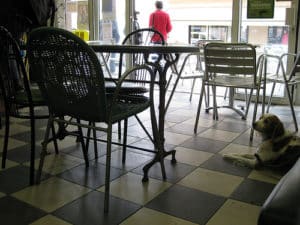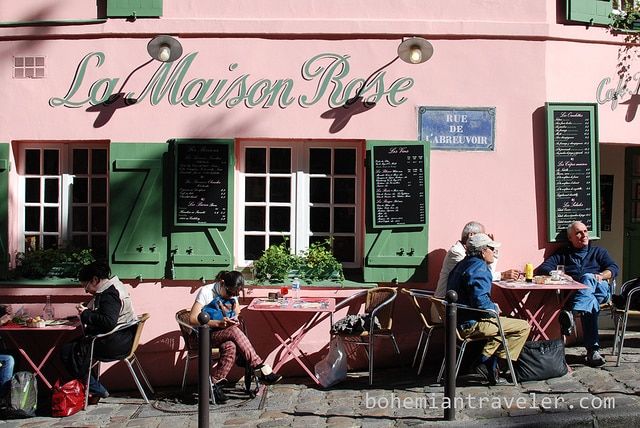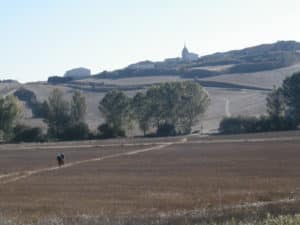I was never really interested in France or French, preferring to study a less bourgeois language like Spanish in school. Not that my language prejudice mattered, because like most Americans I never mastered a second language at all. Sure, I later got by hitchhiking in Cuba with my rudimentary Spanish, but I didn’t speak the language.
And then I married a guy from France. Not able to muster even a bonjour when we met, I knew almost nothing about his native land. The first thing I learned from the French class of our relationship was that regular people speak French too. It’s not a land full of intellectual, castle dwellers contemplating life under chandeliers as I’d snobbishly expected. Learning French in France turned out to be more interesting than any Spanish speaking situation I’d conjured up in my youth. The trouble is, learning any language is a sweaty, humbling endeavor. Which leads to my first piece of advice regarding learning French: start working on it now.
I thought being married to a native speaker meant I’d have an advantage. I was let down to discover you don’t learn French by speaking English to someone with a French accent. So I signed up for a French class at a community college with a professor who seemed to think learning verb conjugation for more tenses than time can possibly exist was the way to go. And so I decided I’d have to wait to learn French. Total immersion would be better for me. I don’t know why I believed living in France would cure my monolingual status. All I had to do was look around at the immigrant communities in my own country to know that a native language doesn’t just fall upon those residing in the land where it’s spoken.
But still, I thought, I’ll pick it up when I get there. I won’t bore you with the depressing story of my first year in France without a tongue. I’ll just tell you it was a dangerously low point in my life, completely self-inflicted. You simply can’t practice speaking with real, live French people when you don’t know any French to practice.
Becoming acclimated and motivated are the two benefits of immersion learning. I just wish I’d activated the motivation prior to moving to France. Instead of interacting with the people I’d crossed an ocean to talk to, I found myself spending a lot of time with my nose in a book, memorizing je suis, tu es, il est, vous etes, nous sommes and ils sont. I could have done that anywhere, having a French backdrop didn’t aid at all really.
Table of Contents
Village learning
 I lived in a small village in Normandie where Anglophones are rare and cause for suspicion. I also had a zero budget for language studies. I planned on learning French from everyday people with self-study at home. My situation made things both harder and easier, almost always painful. I didn’t have the support of a school or class of foreigners nor did I have a community where English was at least a little bit understood. This forced me to practice any pathetic French I could produce. In comes the pain. Sometimes I just had to walk away mid-sentence from someone I otherwise would have liked to get to know. Read on if you’re interested in seeing how my approach turned out.
I lived in a small village in Normandie where Anglophones are rare and cause for suspicion. I also had a zero budget for language studies. I planned on learning French from everyday people with self-study at home. My situation made things both harder and easier, almost always painful. I didn’t have the support of a school or class of foreigners nor did I have a community where English was at least a little bit understood. This forced me to practice any pathetic French I could produce. In comes the pain. Sometimes I just had to walk away mid-sentence from someone I otherwise would have liked to get to know. Read on if you’re interested in seeing how my approach turned out.
Keeping in check with my budget, I decided to find a way to trade for language lessons. I posted my request at bulletin boards in grocery stores, at our local library and other places where I thought I might find someone with similar interests. In my case, I left my announcement at our tiny natural food store where the proprietor ended up becoming my pseudo-agent. My notice read something like Je cherche un echange conversational Anglais/Francais. Je suis Americaine. Je suis prof de yoga, puis je propose un echange yoga/Francais aussi. Let it be known that I was not posting this notice next to other similar ads. My request for a conversation exchange was the only of its kind.
I also did a google search for petites annonces, the French term for classifieds and stumbled on www.vivastreet.fr. This is where my first conversation exchange was born. (Let me note here that there were only two other responses from this site: another American wondering if I’d had any luck with my ad and a young man who seemed a little too eager to come to my apartment.) The one good reply introduced me to a French woman who had lived in Boston for several years with her American husband and father to their two children. Of course I learned all this when she spoke in English, because my ability to understand or say anything in French beyond “I am American. I have brown hair.” was non-existent.
I quickly realized I needed more than conversation. So my natural food store agent gave my number to a young Latin and French teacher at the public school in town. I paid Armelle 30 euros for an hour-and-a-half of instruction on French grammar in French. But it was contact with someone outside of my apartment and that was worth the 30 euros. I think Armelle felt sorry for me because she invited me jogging with a friend of hers, and she took me to see the historic sites of the nearest big town. I’d already been there on my own but I feigned ignorance just to have the opportunity for company. I practiced more French on these free excursions than I did during our lessons.
Get a job
 Armelle was great but she was expensive for an unemployed immigrant. No one else responded to the numerous ads I’d put up so I decided to try finding a job. Perhaps working would get me talking. I worked on my resume every day for a week, then took it to places in town I thought might need an English speaking guide or clerk.
Armelle was great but she was expensive for an unemployed immigrant. No one else responded to the numerous ads I’d put up so I decided to try finding a job. Perhaps working would get me talking. I worked on my resume every day for a week, then took it to places in town I thought might need an English speaking guide or clerk.
I also took it to places I doubted needed my help but that I wanted an excuse to visit. In essence, I used my resume as a sort of letter of introduction, a way to explain my plight without having to talk. In that way, I met the women at a horse stable. I did the math and realized I could pay for an hour of horseback riding with interesting women talking all around me or I could sit and study grammar with Armelle. I started working on ways to let her down easily in French.
At this point in my French sojourn I’d fostered a few acquaintances, but I was still really isolated. My job search proved fruitless in the way of a job. Most of my contact with others was at the market or in shops where exchanges were limited. My husband was working full time and being French, didn’t really know how to reach out. He nicely hinted that perhaps my requests for conversation and my boldness in inviting near strangers over for a drink made local townspeople uneasy. I remember asking: “If you can’t talk to people you don’t know, how do you get to know people?” He still can’t give me an answer. His joke is that in France (at least the region where he comes from) you have to go to the same cafe every day for six months before the staff will acknowledge that they’ve seen you before. For someone living on the cheap, going out for coffee every day to sit alone with not even the promise of a French greeting just wasn’t an option.
Get creative: Assimil at the library
In the larger library of a neighboring town I found my preferred language program, Assimil, a huge selection of French movies (classic and current), dual language books in English and French, as well as lots of books on tape. If your library is too small, do check out the nearest city library. Be prepared to pay for your l’inscription, as libraries are one of the few things in France that aren’t free.
At my smaller local library I made use of the children’s section. I checked out children’s non-fiction books on subjects that interested me, as well as stories that were recorded. My favorite was called Au Revoir Blaireau and came with a CD of a woman reading the touching tale of an old badger coming to the end of his life. When the librarian noticed my books of choice she invited me to the children’s story hour where I sat amongst elementary school children listening to a rather talented woman tell stories about scary witches. It was humbling to realize that even the littlest amongst us were more advanced than I.
Get a hobby
Studying alone in my apartment with few outside distractions prompted me to find some more active hobbies in the area. The tourist office provided me with maps that showed day hikes or circuits traipsing all over the countryside. This was a perfect way to practice what I’d learned. My ability to get home by sundown depended on my understanding of written directions. My first day out was so satisfying that I’ve thought seriously about leading language tours that employ similar situations.
I had to study and figure, but I never spent time memorizing vocabulary. I learned it naturally and can still easily recall all the different verbs French uses to convey “turn left or right.” And there are many ways, as I learned that day. You can veer, you can follow, you can take, you can direct and you can do all of these things just before or after the little wooded area, field, meadow, pasture, bog, pond, lake, stream, creek, gate, fence, statue, enclosure, you name it. Sometimes I would make inferences and then be facing a solid stone wall commenting on my glaring error. Me and the wall, no one else around to scorn or laugh at my mistakes. Save the sheep and horses whom I talked with in French. We discussed the trees I identified using my children’s book on les arbres.
Do something you already know
Another active approach I took was enrolling in a weekly yoga class. Being a trained yoga instructor, I could guess what the teacher was asking in French. Though yoga is a natural way to loosen up and pull out of the ego that keeps you nervous and stuttering, studying anything you already know, in French, might provide a similar experience.
In most French towns, big or small, there are numerous ways to participate in a group activity, cheaply if not free. The first place to go is la mairie, or city hall. They’ll tell you about all of les associations sportives. The options are wide-ranging. Our town had soccer, basketball, hiking, karate, swimming and much more. La Maison de la Jeunesse et de la Culture is also a place to look for ongoing activities. Our MJC offered things like painting, music, aerobics, yoga and family-oriented services like after school study hall and something I learned much later…French lessons for citizens who aren’t fluent.
And then there’s the Accueil des Villes Francaises which is a club whose mission is to welcome newcomers and educate them about the town’s services and attributes. I joined our AVF because they did a 15 km hike every other week and I thought it would be a great way to continue my kinesthetic language studies. It was interesting and enlightening but I still wonder if maybe I learned some old-fashioned expressions from my time with these senior citizens.
Six months into my rigorous self-study and community-member-want-to-be-act, I sulked over the fact that I was not yet fluent. I was frustrated and losing confidence more than gaining it. And then I got my first Carte de Sejour (similar to our green card) appointment. Having gone through the process with my husband in the US I wasn’t looking forward to this ordeal. To my surprise I was not given the run down on obligations at this appointment, rather I walked away with a binder full of resources, in it a list of government organizations devoted to seeing all foreigners fluent in French, most of them free.
Government organization for learning French
At first I couldn’t believe it. I mean, why would all of those expensive language schools exist if anyone could take classes for free in every department in France? I still don’t fully know the answer, but I do know one deterrent to these free lessons is the hassle. You do have to deal with the infamous French bureaucracy to sign up. It’s not easy to get clear answers on where and with whom one should talk. You’ll often get transferred to another person or office, or if in person, get a look like what you’re asking for doesn’t and never will exist. Get used to heavy exhaustive sighs. The reward is free French classes in France.
Not every organization is the same and I’m sure they all vary in each department. I tried several groups in my department and found the Groupement d’Etablissements pour la formation continue (GRETA) to suit me best. I’m not sure it was the organization so much as the luck of the particular teacher they had under contract. Her name was Nadia and she came from Russia, having studied French and linguistics. She married a Frenchman and knew all about feeling lost in a different culture. She was loud and animated, all that the French people I’d observed were not. I loved her, though I often came home with a headache after class.
We met Monday through Friday for three hours each morning. I was the only English speaker in the class, others coming from Tunisia, Algeria, Angola and Morocco. Though not the France I’d envisioned, this was France too, a side I felt lucky to witness so intimately. My husband will attest to the fact that my language ability increased by bounds during this course. I didn’t feel I was learning more than I could have with my library books and CD’s, but I did feel like I had somewhere important to be, and I felt surrounded by others with similar needs. I believe it was the support of that group that made the difference.
Immersion…but not total immersion
Immersion is surely the best way to learn a language, but total immersion can be isolating and even crippling. I was determined not to seek out and rely on English speakers in my region, not wanting to give up my sense of adventure. I wanted to be independent, thus have a richer and fuller experience. Instead, I lost my confidence, and began to feel insurmountably stupid. Just one encounter with someone in similar circumstances would have reminded me that I wasn’t stupid, just mal-equipped. My classes with Nadia showed me that. My confidence returned as did the independence I was trying so hard to maintain.
I was coming up to the one full year in France mark when in one week I received three responses to my ad posted at the natural food store. Martine, the store proprietor, had been talking about me all winter. Turns out people like to cocooner until spring in Normandie. The first sign of a returning sun and my phone began to ring off the hook. It was all good timing because now I actually had something to say in French. My new contacts had similar interests as me and so my network expanded exponentially. I had leads for volunteer posts, jobs and activities that only a month before I’d felt excluded from. And so my last and perhaps most important bit of advice is this: have patience.
More Info:
Organizations to find free classes are:
Groupement d’Etablissements pour la formation continue (GRETA)
Institut Inter Regional d”Education Permanent (INIREP)
Femmes d’Ici et D’ailleurs
Service Informatique recrutement, formation (SEIRF)
Association Nationale pour la Formation Professionnelle des Adultes (AFPA)
If all else fails, go to the prefecture in your region and ask for a list of all organizations that offer formation or cours de langue. Also try your Agence Nationale de l’Accueil des Etrangers et des Migrations (ANAEM) for a list. Or you can register with Agence Nationale pour l’Emploi (ANPE) which is the national employment agency. They’ll help you find job skill classes, language courses included. Also, go to the public school in districts with a large immigrant population. Sometimes principals will organize classes for foreign-speaking parents and they’re always happy to have regular attendees as it helps keep the programs funded.
Again, be prepared for confused looks at all of these offices. Be persistent and have patience. In time, you’ll find a course and a prof that meet your needs.
Other possibilities
Though I encourage serious language learners to stay put in one community to develop relationships and continuity rather than constant travel where conversation never goes beyond how much do I owe you and when do I have to check out, extended stay trips are a nice way to practice and learn with others. I stayed for one month on a farm in Brittany as a volunteer through WWOOF and had the opportunity to work in the farm’s cafe as a clerk. Talk about a crash course! I also stayed at a yoga retreat called Centre de Yoga de l’Aube where meals and rooms are cheap in lieu of karma/action yoga. You have daily duties assigned to you during your stay. It’s a beautiful, clean and inspiring place, a safe environment to practice your French. But if you’re not serious or interested in yoga, perhaps this is not the best choice. Other similar situations are the Sivananda centers in Orleans and Viveka Yoga Retreats in the Pyrenees. Viveka accepts WWOOF volunteers during certain months.
My favorite lesson books
Assimil New French with Ease, book and CD’s—an immersion approach that encourages short daily lessons
Usborne Easy French, Fast Track French for Beginners—a small, pack-able book with short easy lessons introducing the basics including helpful internet links where you can practice what you’ve learned
French Made Simple by Eugene Jackson and Antonio Rubio– a good introduction to the basics with written and oral exercises and a superb pronunciation guide in the first two chapters with diagrams showing where certain weird French sounds come from in your mouth
Suggested minimum basics
- Present tense forms of to have and to be
- Basic pronunciation, this takes time so practice now
- Numbers, hard to purchase without them
- Basic polite phrases like hello, goodbye, please, thank you, you’re welcome
- Alphabet, makes it easy to spell out your foreign name for bureaucrats
- Directional words like left, right, straight…where’s the bathroom
- As much vocabulary as possible, start by labeling all the contents of your house in French
Related Material:
The Story of French by Jean-Benoit Nadeau and Julie Barlow– An interesting book on French, why it is the way it is, why it has the reputation it does and how it has influenced its speakers and the world
Living France a British magazine devoted to Brits who own property in France. A great resource to help English speakers assimilate in France. Offers advice on buying property, but also settling in France and all that’s involved from learning French to finding the right school for your children. Each month there’s a section on lingo where they give all the words one might need to get a task accomplished like going to the hardware store or perhaps visiting a doctor’s office.
Me Talk Pretty One Day By David Sedaris– A collection of essays that humorously discuss the author’s experiences learning French while living in France. An essential read one should visit regularly, like an English-speaking psychologist.
.





Pingback: Avery Sumner | Gomad Nomad Travel Mag
Great article Avery…Appreciated your help in Paris
Avery,
What a great article. I’d love to go the same route to learn the language better- maybe someday. Your search to find the proper venue for learning/immersion was well thought out and investigated. Updates of your progress every 6 months or so would be welcomed. Thanks, Rob
Very, Very, VERY well done. Loved it!
Ivan
Avery,
What a delightful article! I couldn’t stop reading it. I admire the courage and perseverance it took on your part to live in France so long “without a tongue.” That would, without a doubt, be the most effective way to learn the language. I have a journalism class at Towns County Middle School where your mother is the principal and I know your father, also.
Hi Avery! A beautifully written article. I have been trying to find you for many years- we were in Ms. Winchester’s class in Thomasville, Georgia many moons ago. I think you keep in touch with Candace-aka Candy. JOIN FACEBOOK SO WE CAN KEEP IN TOUCH. I am glad you are doing well- you have a great writing style!
Hey Tina, no havn’t facebooked myself yet…can’t seem to bring myself to do it…you’re not the first to be annoyed by my tardiness 🙂 Try me at sumneravery@gmail.com Would love to hear more from you.
Haha…vous parle bellez aujord hui and vous etes tres accrocheuse Avery!
Particularly enjoyed the read, having done the same in Austria for a year. Kudos for your dedication & persistence!
Haven’t done the same in France, but live in London and would love to bite the bullet and go live there for a year or two.
Also should comment on the modern day Whistler photo of you and Alain – very drole 😀
This is an excellent article, especially for someone like me who just moved to France two months ago with my French husband and am floundering a bit. You have a lot of useful information here. I hope you don’t mind that I wrote you a little email. I figured it wouldn’t hurt to try. I am searching for any (French language/culture)info I can get my hands on.
Thanks again!
Berny
(Bernadette Awwad in Besançon 🙂
Wow! Thank you so much for writing a thorough article on learning French! I am hopefully moving to France long-term and though I speak Spanish fluently, I knew no French before arriving in Paris two months ago. I thought total immersion would be the best way for me to learn the lingo too-but then I realized far too many people speak English and the ones who don’t aren’t really interested in trying to talk to you anyway. My french phrasebook and dictionary weren’t much help either. I also bought the Assimil book and I love it! I have a long way to go but I’ll be referencing this article!!
Hey Mariah,
Love your blog and mission. Thanks for reading this (sort of outdated) bit about suffering through the joys of learning a foreign language as an adult. I’ve since relocated to the south of France on the border of Spain. Years later, France and French are now permanently engraved in my heart. Alas, I encourage you to stick with it as the voyage only gets richer, though not necessarily easier 🙂 . One practical update, the ANPE I mention is now the POLE EMPLOI and though they aren’t at all good at helping you find an “emploi,” they’re very good at helping you find resources if you persist. Once you’re settled, you should definitely register with them. And get in touch if you need an ear or an encouraging word. As one American writer in Paris once wrote, if you don’t have the details figured out before winter, brace yourself, life can get hard and lonely… But that’s not necessarily a bad thing? Enjoy the ride. sumneravery@gmail.com, realtravelfrance.com
What a lovely, well written and informative article. Thank you so much Avery (such a beautiful name also by the way :), for sharing your journey and knowledge acquired. I am learning French, a little by little, so can relate somewhat without the immersion factor. I had thought that may be a good option but your experiences and insights will certainly give me some additional food for thought.
Hope the article was useful to you Paula. Glad to hear you’re learning French, such a wonderful and enriching road… Stick with it and you’ll be surprised at your progress. If you have any questions or just need encouraging words, you can contact me through my website http://realtravelfrance.com/ Bon courage!